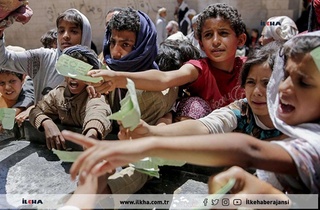Eight years of conflict have killed nearly 400,000 people, and uprooted millions of others. They have turned Yemen’s roads, bridges and hospitals into rubble, robbed people of jobs and children of futures.
More than two-thirds of Yemen’s 30 million people need humanitarian assistance. More than half face crisis or above hunger levels.
Soaring food prices—bumped up even higher with the war in Ukraine—have added another layer of hardship on a population that grew most of its food half a century ago. Today, Yemen imports 90 percent of it—sourcing nearly half of its wheat in 2021 alone from Russia and Ukraine.
“You see the desperation to get food on people’s faces. I have to explain why we’re cutting rations, and the challenges around the global resource environment. People just don’t have any hope,” Ragan said.
There are a few cracks of light, though. Yemen’s five-month-old ceasefire is fragile but still holding. The first Yemen-bound humanitarian cargo of WFP wheat since Ukraine’s conflict is expected to arrive by mid-October.
Still the shipment amounts to just over one-third of WFP’s monthly distributions— underscoring the massive role we play in reaching the country’s hungriest.
“It’s important from a humanitarian perspective because it symbolizes WFP’s access to a portion of the stocks that have been locked up,” Ragan says. “And also, for the private sector” whose survival and growth are crucial to prevent more people from falling into hunger, and for Yemen’s longer-term development.
Reaching those most vulnerable in Yemen is not easy. With shambolic infrastructure and complex security procedures — and multiple armed groups in the South especially — it can take weeks or even months more to deliver and receive vital assistance.
“The most challenging aspect of working in Yemen is the security environment,” Ragan emphasized. (ILKHA)



 Güncel
Güncel
 Güncel
Güncel
 Güncel
Güncel
 Dünya
Dünya
 Dünya
Dünya
 Güncel
Güncel
 Güncel
Güncel
 Dünya
Dünya
 Güncel
Güncel
 Dünya
Dünya





